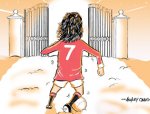crafty cokcney
New Member
Thanks for the memories George
For me growing up in London in the 60's George Best was football. He inspired all of us as kids to play football every minute of the day so we could try to be just like him and try moves we had seen on tele on our mates. Everybody wanted to be George Best.
I had constant David Coleman or Brian Moore play by play commentaries running through my head as I played, with me being George. To say he had an influence on me playing football would be an understatement, the same as millions of other people who watched and admired everything he done when he was on the field.
Today we remember George as the most complete and naturally gifted player to ever lace up a pair of boots and try not to be affected with what went on in his personal life. As Best said himself, he took football off the back page of the papers and put it on page one.
Besty had it all, on and off the field. When asked by a reporter once.."George, is it true you have slept with four Miss Worlds..?" George replies.."No that's not true at all,...I never showed up for the last two..?
For those of us that experienced Best in one way or another during our lives...we were truly blessed. A true legend in every sense of the word.
God bless you George and thanks for the memories.
RIP
For me growing up in London in the 60's George Best was football. He inspired all of us as kids to play football every minute of the day so we could try to be just like him and try moves we had seen on tele on our mates. Everybody wanted to be George Best.
I had constant David Coleman or Brian Moore play by play commentaries running through my head as I played, with me being George. To say he had an influence on me playing football would be an understatement, the same as millions of other people who watched and admired everything he done when he was on the field.
Today we remember George as the most complete and naturally gifted player to ever lace up a pair of boots and try not to be affected with what went on in his personal life. As Best said himself, he took football off the back page of the papers and put it on page one.
Besty had it all, on and off the field. When asked by a reporter once.."George, is it true you have slept with four Miss Worlds..?" George replies.."No that's not true at all,...I never showed up for the last two..?
For those of us that experienced Best in one way or another during our lives...we were truly blessed. A true legend in every sense of the word.
God bless you George and thanks for the memories.
RIP
